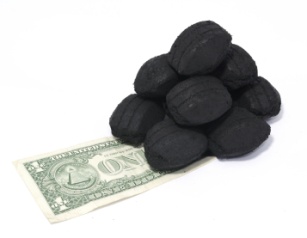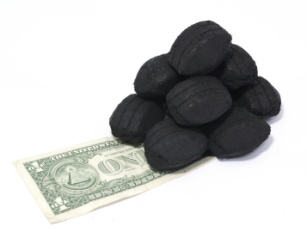
It’s easy to understand. We’ve had eight years of across-the-board hostility to sustainability investments by Bush & Co., and before that eight years of promises with no follow-through by the Clinton crowd. Now green groups are dazzled by the prospect of hundreds of billions of new dollars for mass transit, energy efficiency, and other projects, courtesy of carbon auctions. Their websites overflow with starry visions of how all this money can be spent, reminding us of all the pent-up needs from decades of neglect.
This strategy is deeply mistaken, and it risks pushing serious action against climate change many more years into the future, a delay we earthlings can ill afford.
Granted, the mainstream organizations are fighting the good fight on several key points. They recognize the need for strong action to reduce carbon emissions as soon as possible. They know that a central piece of the policy package must be a system of carbon permits, without which no one would have the legal right to extract carbon fuels from the earth or import them into our economy. These permits would be capped, and the cap would be tightened over time. Finally, the green groups have lined up behind the necessity of auctioning off the permits, rather than giving them away. All of these are laudable positions.
It is at the next stage, what to do with the auction revenue, that they go seriously wrong. Consider, for instance, the Sierra Club. Their website describes the sort of programs auction revenues should fund:
Such programs include financial assistance to help low and moderate-income consumers and workers offset higher energy costs as well as programs that assist with adaptation efforts in communities vulnerable to the effects of climate change. Revenue generated from emissions allowances should also aid the expansion of renewable and efficient energy technologies that quickly, cleanly, cheaply, and safely reduce our dependence on fossil fuels and curb global warming.
Similarly, the Natural Resources Defense Council website says, “The sale of pollution allowances would bring in new government revenue, allowing funds to be redirected toward infrastructure improvements and incentives for innovation.”
To be clear, I fully understand why these folks want to funnel carbon revenues into green projects. We need these investments desperately, and a fully auctioned carbon permit system would mobilize hundreds of billions of dollars soon after takeoff. But the money won’t be there if the carbon cap isn’t established in the first place, or if the political will to auction the permits falls short, and the strategy of spending auction revenues on environmental projects makes it less likely that there will be money to spend.
Face it: the carbon cap is a tax. Those megabucks have to come from somewhere, and where they will come from is us, in the form of higher prices for goods and services that use carbon inputs. Gas will become much more expensive, and so will heating oil and cement and a thousand other things. In effect, we will be paying an enormous sales tax on top of the taxes we already pay. So far as it goes, there is nothing wrong with this: it’s a feature, not a bug. It’s the way we will commit ourselves to consuming less of the stuff that’s endangering the planet. But it’s still a tax.
The political and business interests fighting a carbon cap will make this their central argument. They will concede that climate change is real and needs to be addressed, but they will say a cap is the wrong way to go, because such a large tax would be financially crushing. Worse, as a sales tax, the cap would be regressive, with larger impacts on the budgets of the poor than the rich. The Sierra Club goes part of the way to recognizing this in their proposal to use some of the revenues to help those on the lower end of the income scale. Creating a special benefit program, however, would hardly undo the regressive effects of the tax as a whole: the Club doesn’t promise (nor could they) that the full financial effect for the hardest-hit families would be offset, nor that the impacts for the great majority (who are also voters) will be offset, nor, above all, that anyone could guarantee that this benefit program will be well-funded year after year. Realistically, their reassurances will not be enough to assuage the fear of most households that they are about to get soaked.
But it’s even worse than this. We are in a serious economic downturn. Opponents of the cap will say this is no time for a major tax hike, and they will be right. The worst kind of tax to impose right now is a regressive sales tax — like the one a carbon cap would produce — that eviscerates family budgets and makes it more difficult for them to cope. It’s all well and good to promise that the government will spend this money wisely and reinject it back into the economy, but this takes time and, in any case, households trying to scrape through this crisis are not going to be reassured by visions of green jobs that only some will get. If you think they will ignore the anti-cap arguments and happily vote to tax themselves during an economic emergency for the good of the planet, you’re wrong.
Moreover, there is every indication that this financial mess will be with us for years. We can’t afford to wait until the economy recovers to put a lid on our carbon emissions.
And there is still another problem: why do the green groups assume that the government will spend these new carbon dollars any better than they spend the ones they already have? For an early indication of how political reality may differ from fantasy, see the design recommendations of the Western Climate Initiative, which propose such guidelines as “promoting economic efficiency.”
There is an overwhelming message to all of this, which environmental groups need to confront: it is absolutely necessary, for political reasons alone, for carbon legislation to be written in such a way that the auction revenues are given back — all, or virtually all, of them. Take the money and, several times a year, distribute it equally among all citizens. Only in this way can people be convinced that the cap will not hit them like a monster tax increase, imposing an extra burden during a period of economic hardship. Over time, if we get a carbon cap, and if the price carbon-intensive goods goes up dramatically, there will be much more support for redirecting government spending toward energy efficiency and sustainable infrastructure.
This is a time for leadership by environmentalists. They need to transcend the role of lobbyists, angling for a bigger share of the spending pie, in the struggle to get meaningful carbon legislation. By trying to use a carbon cap as a revenue stream for their own agenda, they are making it much more likely there will be no cap at all, or that businesses will be given the permits for free. Even during a time of deep economic distress, we can do what needs to be done for the climate, but only if the financial burden on households is kept to the minimum possible level. There are plenty of other opportunities for funding green projects out of existing taxes and economic stimulus.



